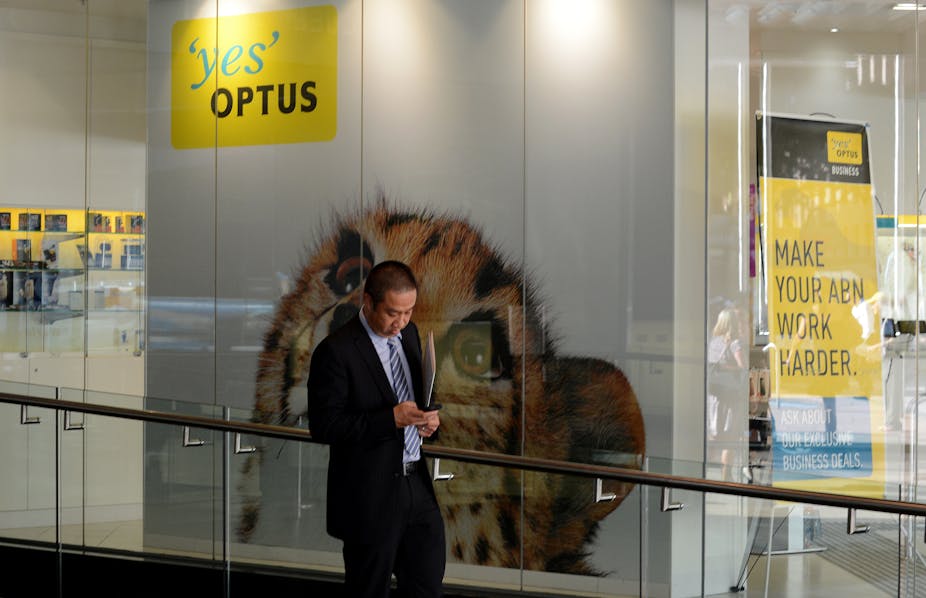The significance of last Friday’s Federal Court decision to prevent Optus’ “TV Now” service from broadcasting was made clear to me while waiting for a bus in Melbourne’s suburbs.
Earlier that day, I had read news reports about the successful legal appeal by the AFL, NRL and Telstra that resulted in the suspension of Optus’ mobile recording service.
The bus shelter where I was waiting was dominated by a large advertisement selling AFL coverage on Telstra’s mobile network, promising live games for subscribers. Sitting at the back of the bus a few minutes later, I observed that about three-quarters of the passengers were engrossed by the content on their smartphone screens – text messages, social networking, websites, video and so on. It seemed odd to observe only two phone conversations over the course of my journey.
The mobile market
Mobile media markets and consumption are now a reality in major cities, presaging an escalating commercial battle for millions of users and their credit card numbers. The pursuit of exclusive control over the popular and profitable male football codes affords insight into the future of this media landscape.
Increasing numbers of fans already watch live coverage on one screen while they check their Facebook profile, access Twitter, and respond to text messages on another. Meshing television, mobile and tablet computer use, multi-tasking of this sort is a growing phenomenon in relation to live sport and reality television viewing in both the United States and Australia.
Highlighting an affinity between sport and mobile devices, the use of smartphones is also apparent to anyone who has lately attended a game at a major stadium. Fans use their smartphones as their ticket of entry at the gate, check footage and results from other fixtures, and exchange messages with friends and fans watching the match elsewhere.
According to an overseas study, sports events are the second most popular location for the use of instant messaging, ranked behind “crowded public transport” and ahead of “busy meetings” and campus classrooms.
The latest mobile apps targeted at British and American sports enthusiasts – Fancru, PlayUp, Phanoto, Share the Match – combine chat, photo-sharing and location based services. Many tech start-ups, investors and telcos know how much money there is to be made in the so-called “mobile space”.
Mobile television is pivotal in these activities and arrangements. According to the BBC’s Phil Fearnley, the 2012 London Olympics are set to highlight the appeal of mobile and online media in much the same way that Queen Elizabeth II’s coronation in 1953 displayed the potential of broadcast television to a mass audience.
Empire building
The anxiety experienced by the AFL, NRL and Telstra over the possible outcome of their appeal against Justice Rares’ original decision in February (that favoured Optus) needs to be placed in this broader context, as should their triumphalism upon receiving the result.
The recent court proceedings are about control of the future, as much as the present. According to the football codes, the TV Now mobile service could not be allowed to continue its operation and offer “near-live” recordings of football from free-to-air television at minimal cost to Optus. Such an outcome would stifle the digital media empires that many elite level sports hope to build in a post-NBN environment.
The foundations of these empires are already being laid. The AFL has formed its own media company. AFL boss Andrew Demetriou announced last August on The Conversation that the league is looking to sell games direct to the consumer via the NBN.
The NRL’s David Gallop said on Friday that the TV Now decision would allow rugby league to “develop innovative new ways of experiencing the game”. Mobile media services are central to both of these strategies.
Laying down the law
Yet Friday’s decision was only one part of a much larger game. The big decision the AFL and NRL are after would be enshrined in federal legislation. Consulting each other via the Coalition of Major Professional and Participation Sports (COMPPS), the big sports are chasing a purportedly “quick but simple” amendment to time-shifting provisions contained in the Copyright Act.
Their demand is justified on the basis that “the technology has overtaken the law” and, if acceded to, would offer additional protection against the likes of Optus’ TV Now service. It would also create a potentially significant disincentive to the development of new mobile recording services and streaming technologies, irrespective of whether they are related to sports content.
For those who are interested in these debates, the real action is occurring in the offices of Stephen Conroy, the Minister for Broadband, Communications and Digital Economy, and Nicola Roxon, the Attorney-General. The latter has charged the Australian Law Reform Commission with the task of completing a formal review of copyright in digital environments.
The ability to watch the footy on a bus has quickly become a very big deal.
Brett Hutchins is the co-author of the recently released book, Sport Beyond Television: The Internet, Digital Media and the Rise of Networked Media Sport (Routledge, 2012).

